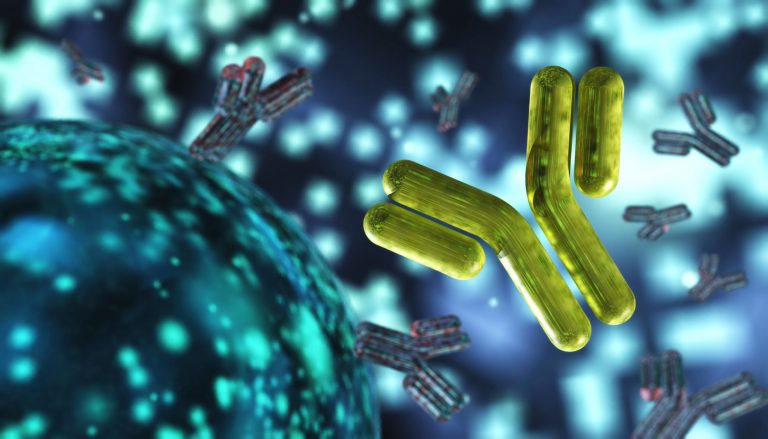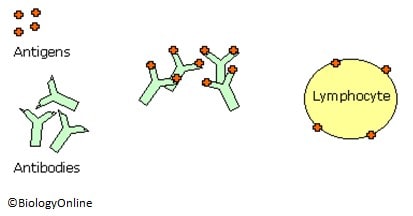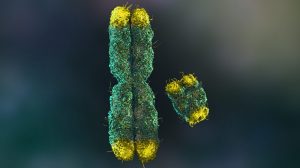Passive and Active Types of Immunity

3D rendering of an antibody
Table of Contents
The previous tutorial investigated the role of white blood cells in phagocytosis. White blood cells are also responsible for antibody formation. Certain antibodies are synthesized in response to the presence of certain antigens
Specific Immune Responses
Lymphocytes are a type of white blood cell capable of producing a specific immune response to unique antigens. Some of these lymphocytes are capable of entrapping antigens on their surface.
When lymphocytes catch these antigens they can then begin to code for unique antibodies, structures that are capable of catching these antigens.
The lymphocytes code for a particular antibody on response to a particular antigen. The antibody that is formed will be capable of catching free antigens, therefore, neutralizing the threat as seen below.

B lymphocytes (B Cells) produce free moving antibodies as above while T lymphocytes (T Cells) produce antibodies on their surface.
Types of Immunity
When attacked an organism has several means in which it can prepare to defend itself in event of an attack.
- Active Immunity – Vaccines are used for health purposes to expose our bodies to a particular antigen. These antigens are usually killed or severely weakened to decrease their potency. After destroying these pathogens, the body stores some T cells as memory cells, due to the fact the code for a particular antigen and can be when needed. This memory in T cells can be a means of artificially acquiring immunity while a genuine attack by a pathogen is a naturally acquired type of immunity.
- Passive Immunity – This is where immunity to particular antigens as a result of genetic traits passed on from parents rendering the offspring immune to a particular pathogenic threat.
All of the information on this and the previous page are common methods of defense in red-blooded animals, the next tutorial investigates the defensive means of plants.
You will also like...

Soils
Nutrients in the soil are essential to the proper growth of a land plant. This tutorial deals with the properties of soi..

Plant Biology
Plantlife can be studied at a variety of levels, from the molecular, genetic and biochemical level through organelles, c..

Circulation
The circulatory system is key to the transport of vital biomolecules and nutrients throughout the body. Learn about the ..

Homeostasis of Organism Water Regulation
Osmoregulation is the regulation of water concentrations in the bloodstream, effectively controlling the amount of water..

Chromosomes X and Y and Sex Determination
This tutorial looks at sex determination via the sex chromosomes, X and Y. Read it to get more info on X and Y chromosom..

Bryophytes
Bryophytes (nonvascular plants) are a plant group characterized by lacking vascular tissues. They include the mosses, th..
